Desperate for a spark, down two breaks to Carleton in the finals of the 2013 College Championships, Oregon’s Ashley Young stepped up in a big way. With Carleton on the doorstep for a crucial second upwind break, Syzygy’s star cutter Marley Hartman-Filson broke for the opposite side of the endzone and the forehand appeared out in the space in front of her. But Young fought to make up ground and exploded into the air past Hartman-Filson for an electrifying layout catch block that resuscitated Oregon’s lifeless defense and elicited a huge roar from the crowd.
Coach Lou Burruss and captain Bailey Zahniser both separately credited Young’s huge block for energizing the team and getting them back on track. Oregon Fugue is a team predicated on defensive pressure. “They want to play possession [ultimate], and we want to turn it over to play more defense,” Burruss said before the game. For the first six and a half points leading up to Young’s play Oregon was executing the first part of their gameplan but not the second. With Carleton playing their possession game well and a earning pair of breaks, they took a 4-2 lead and nearly made it 5-2.
But after Young’s block, Fugue outscored Syzygy 13-4, including five in a row to end the first half and six in a row to end the game. The final score was 15-8 as Oregon Fugue defeated Carleton Syzygy to win their second College Championship in four years, with All-American Zahniser, Morgan Zajonc, Kimber Coles, Lily Herd, and Rachel Karpelowitz earning a 2013 gold medal to go with their gold from 2010. Zahniser and Zajonc both made huge contributions on both sides of the disc in their final collegiate appearance.
All season long Oregon has been dominant on defense, their 37-1 record one of the best of all time, with their unorthodox style of play on both sides of the disc nearly impossible to prepare for strategically and mentally. Burruss said after their 15-4 quarterfinal victory over British Columbia, “We do things differently than every other team, and that’s an advantage – even if our way is not necessarily the most effective way.” Teams can’t prepare for facing Oregon without playing games against Oregon, which is part of the reason Oregon’s two closest games of the season, an 8-12 loss to British Columbia and an 11-10 win over Washington, were both against teams in their region.
Oregon wears teams down with their fast-paced offense, designed to maximize yardage and strike for the endzone at every possible opportunity. Turnovers are acceptable, even welcome, as every Oregon possession inflicts a toll on their opponents’ mental state whether it results in a goal or not. On defense, Oregon switches between tough man defense, making every handler and cutter grind for every inch of field position, poachy man defense, designed to disrupt teams’ flow and take away their favorite looks, and their signature junk defense that crowds the middle of the field and rapidly closes down on throwing lanes that were open just a second before.
But despite Oregon’s reputation for primarily relying on their junk defense to generate blocks, Fugue was determined to win the battle woman to woman. Burruss saw a depth advantage for Oregon and rotated defenders on Carleton’s primary playmakers, who played the majority if not all of the final. Burruss singled out Julia Snyder as a dangerous playmaker for her propensity to play in front of the disc as well as behind, in addition to her considerable disc skills and athleticism.
Callahan runner-up Bailey Zahniser was responsible for shutting Snyder down, getting the better of her at almost every turn. Snyder had her moments as every great player does, but she did not have nearly the same impact in the finals as she did in the semifinals or their crucial pool play win over British Columbia. Snyder finished with just three assists – Carleton’s first two, and then one shortly after halftime after nearly getting D’ed by a flying Zahniser. Zahniser even got poach blocks while ostensibly guarding Snyder – her poach block in the first half led to Oregon’s first break. After that, Snyder started to move around downfield even more – not just to get open herself, but dragging Zahniser around the field to prevent her from poaching while tiring herself out in the process.
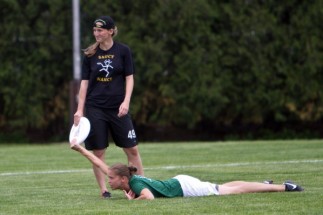
Morgan Zajonc holds on to the disc after a defensive bid in the semifinals (Nick Lindeke - Ultiphotos)
After taking time off from Oregon, Morgan Zajonc returned to Fugue in time for the College Championships and took on a monumental task in the championship – containing Flannery McArdle, Carleton’s 6’0″ go-to receiver who hauled in 8 goals in the semifinals. Early on, McArdle made the 5’8″ Anna Almy look foolish – going over her to reel in a huck – but Zajonc is a more explosive player, two inches taller, and an overall better matchup for Oregon. McArdle won the first battle, narrowly snagging the disc on a fast-closing Zajonc, but after that it was far more even. Zajonc won the next one, with an upwind-break-saving D on an Anna Reed huck, and after that the two went back and forth, with the player on defense usually winning the contest.
Carleton had been relying on big performances from McArdle and Marley Hartman-Filson to carry them through to the finals, but both players were carrying injuries – McArdle with a knee injured before the tournament started, and Hartman-Filson with a shoulder injury sustained early in the weekend. Despite their struggles, both players still stamped their authority on the game – McArdle finished with five goals, while Hartman-Filson had two and numerous other contested deep catches. However, Carleton went to that well too often, and with Zajonc and Bethany Kaylor playing good defense on Syzygy’s top receivers and very tough straight-up marks and tight handler defense, most of their catches were made on high-stall bailout throws.
In the end, the difference was clearly Oregon’s tight defense, especially after Young’s crucial block. Burruss wanted to wear down Carleton’s star players and use Fugue’s speed advantage, and they did so with flat marks, forcing throws wide and making hucks difficult. After getting burned early on by Carleton’s deep receivers, he stressed the importance of staying close to cutters downfield at all times. Molly Munson, Jesse Shofner, Alex Ode, and Dre Fontenot played fantastic handler defense on Anna Reed, Taylor Want, and Kirstie Barton, denying them the break throws and handler give-and-gos they used so effectively against Ohio State in the semifinals.
Carleton didn’t make things any easier for themselves by stagnating downfield. When they offense was working early on, they were clearing out of the cutting lanes and deep space and opening it up for one-on-one cutter against defender isolation cuts. But as Oregon turned up the pressure, Carleton cutters started cutting each other off, lingering in the break and deep space, and forcing handlers to take riskier throws. Syzygy’s two main advantages going into the game were their height and their possession offense, but when Oregon tightened the screws, Carleton found themselves playing Oregon’s game, taking lots of shots at the endzone and abandoning their possession offense.
After Young’s block, a second crucial turning point in the match came early in the second half. Carleton entered the half down only a pair of breaks, and they broke back quickly to narrow the gap to 8-9. Carleton came out in an aggressive zone look, with a very tall cup and Oregon going upwind. But Sophie Darch would not be denied as she fired a visionary high forehand huck from the middle of the field over the cup to Zajonc, the wing on the forehand sideline, to break the zone wide open. Zajonc dumped to Kaylor, who threw a fantastic backhand huck into space for Alex Ode for the first upwind hold of the game.
That upwind break Carleton had just scored would end up their last score of the game. Following their upwind hold, Oregon broke downwind, and then they broke again upwind when Ashley Young hit Zajonc at the front cone after she beat McArdle one-on-one. Carleton was gassed, with Reed, Snyder, Want, and McArdle playing point after point and barely leaving the field. Oregon closed out the game with three more breaks to cap a 6-0 run following Carleton’s lone break in the second half.
For Carleton, the loss in finals caps a fantastic comeback season for Syzygy. “After not making Nationals last year, finishing second means a lot. A lot of people doubted we deserved the second seed, and we proved a lot of people wrong,” coach Megan Molteni said after the game. Captains Julia Snyder and Anna Reed spoke all weekend about just wanting to get more points to play with their team. “Every point is a gift,” is a refrain they repeated, and their team atmosphere was one of pure positivity – and Syzygy has plenty to be positive about. For Anna Reed, the silver medal is a touchstone on a fantastic college career, and for Snyder and freshmen like Kirstie Barton, it’s something to build on.
And while some may question the methods of Oregon, nobody doubts the results. Fugue’s Clown Tent philosophy and brash, fun-loving personality were ever-present this year in their run to the College Championship, in their medal ceremony, and in their celebration. For this group of Oregon players, the question was never “will they win a championship?” – the question was always “how many?” With Darch only a junior and Kaylor, Shofner, and Ode merely sophomores, there is a very strong core to build around in the future. Oregon was the most dominant team of this college season, and possibly of the last several. Their defensive intensity and pressure should be talking points for coaches across the country – in all divisions.
Congratulations to the 2013 College Champions – Oregon Fugue.
Feature photo of Oregon Fugue by Alex Fraser (Ultiphotos).
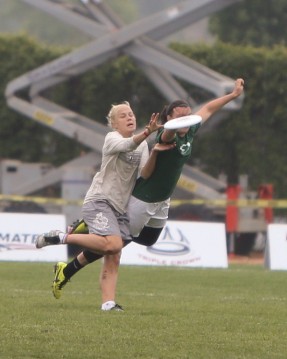
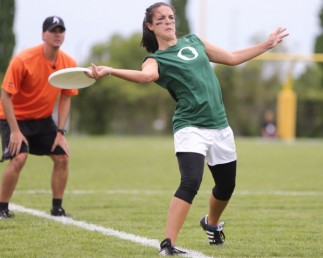
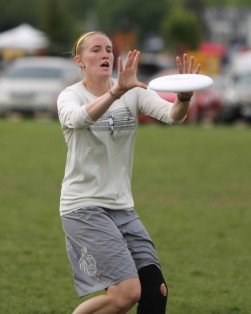
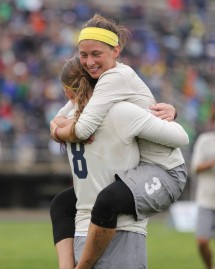









Comments Policy: At Skyd, we value all legitimate contributions to the discussion of ultimate. However, please ensure your input is respectful. Hateful, slanderous, or disrespectful comments will be deleted. For grammatical, factual, and typographic errors, instead of leaving a comment, please e-mail our editors directly at editors [at] skydmagazine.com.